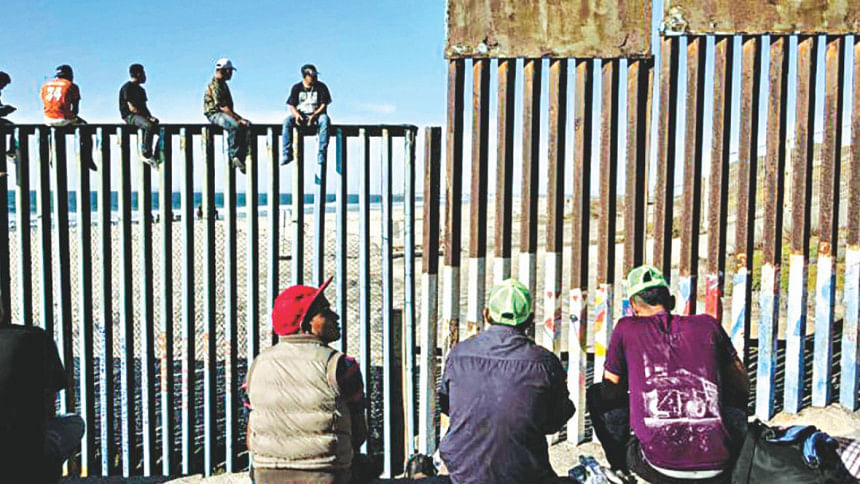The never-ending wall stalemate

A nail-biting drama is unfolding over US President Donald Trump's inflexible demand for a wall on the US-Mexico border and the Democratic-led Congress's equally resolute refusal to give him the money. In an attempt to pressure the Congress, Mr Trump has refused to sign the expenditure proposal that the Congress put up, thus shutting down the government.
The issue has been in the daily limelight in global airwaves and media since the shutdown began over three weeks back on December 22, 2018. It is the third time that a shutdown has happened since Mr Trump became president and is the longest in US history. How the shutdown drama will end, whether it will end in a good way, which side will blink first, and how his stand will affect his 2020 reelection prospects are some questions that have emerged amidst the ongoing stalemate.
The Senate controlled by the Republicans has so far stood behind the president. There are some Republicans who think that Mr Trump is wrong. Whether or not more Republican senators will begin to reconsider their views, driven by their 2020 reelection calculus, is another question.
Each side has tried to win public support by arguing its case. Mr Trump, in his typical intimidating style, has tried to work up a crisis atmosphere. He has made inflammatory statements that America is being invaded by criminal gangs, drug dealers, rapists and so forth. He threatened to declare emergency and use his executive power to divert funds from other areas to build the wall. Warned by some of his advisers that imposing emergency will lead to court challenges on the grounds that he is abusing his power, and embroil him in more complications, he has desisted from such a course, at least so far. Some experts have also said that if Mr Trump uses executive power to push his agenda, it will create a dangerous precedent for a Democratic president in future to use the same authority to grab funds for pushing climate change agendas.
Mr Trump's contention that there is a humanitarian crisis on the southern border is a distortion of the real situation. He argues that the alleged crisis stems from "vast quantities of illegal drugs" and "vicious coyotes and ruthless gangs" prey on immigrant women and children in particular. Notably, the US Drug Enforcement Administration (DEA) has shown that drug smuggling across the border mostly occurs by driving cars through official border checkpoints.
Another thing to note is that the number of illegal immigrants in US has sharply dropped. In fiscal year 2017, 310,531 people were arrested for being in the country illegally, the lowest figure since 1971. Since 2008, the influx of illegal immigrants has steadily remained low.
A report in The Guardian published on January 15 ("What exactly is Trump's border wall and why does he want $5.7bn for it?") has pointed out some enlightening revelations that provide a fresh perspective on some of Mr Trump's claims about the border issue. One point made is that Mr Trump's fear-mongering that there is an invasion taking place on the southern border by gangs of criminals is unsupported by facts. According to the Department of Homeland Security, in fiscal year 2017, 303,916 people were apprehended on the Mexican border. Of them, 13 percent were afraid of returning to their home country and were seeking asylum, a legitimate request. In the same year, more than 606,926 people entered the US by air or sea (not land), overstayed their visas and became illegals. From the figures mentioned here, it can be seen that: (i) there are means other than the wall to check the inflow of illegal immigrants, and (ii) Mr Trump's administration wrongly, and perhaps purposely, makes a specious use of the term "illegal" to describe completely legal attempts to come to America. Far-right immigration opponents and senior Trump administration officials have been working to restrict the asylum process.
As far as the Democrats in Congress are concerned, their position is that Mr Trump has tried to "manufacture" a crisis. They think that providing an allocation of USD 5.7 billion is a wasteful, and an unjustified, expenditure. They think that the number of illegals coming through the US-Mexico border is low and not alarming. There are more illegals in America who, although did not enter the country illegally, later became illegals. The Democrats also believe that public sentiments are in their favour so that in a long battle of attrition, it is Mr Trump who will be in a more precarious position.
A CNN poll conducted by SRSS revealed some interesting figures, and could perhaps provide more clarity for the layman. According to the poll, 56 percent oppose the wall; 39 percent are in favour of it; 45 percent think there is a crisis; and 52 percent think there is no crisis. Moreover, Mr Trump's current approval rating stands at: 37 percent – approve, and 57 percent – disapprove. On the shutdown, 55 percent blame Mr Trump and 32 percent blame Democrats. The CNN poll also shows that public opinion on the wall runs on partisan lines. Nine out of 10 Democrats oppose the wall while eight out of 10 Republicans support the wall.
In order to contextualise the present shutdown, a brief look at the political background of the present tussle between Mr Trump and the Democrats in Congress is in order. Some analysts have pointed out quite cogently that when his team was crafting the campaign strategy for his 2016 presidential run, they came up with the theory that for a person like him who is not very comfortable with complex details or nuances of certain issues, it would be more sensible to identify some simple issues which could be pushed to mobilise his core support groups. A tough line on immigration was chosen as one such issue. And one of Mr Trump's campaign promises was to build a wall on the Mexican border to deter illegal immigrants. Now, for Mr Trump to be thwarted by the Democrats over this would be very humiliating. An ego-driven man, Mr Trump will not retreat easily.
Mr Trump's method has been that when in crisis, make a bigger issue and create distraction to throw your adversaries off balance. But will that method work this time?
Ziaus Shams Chowdhury is a former ambassador.





Comments